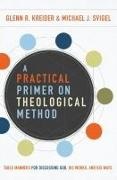Share
Fr. 22.50
Glenn R. Kreider, Michael J. Svigel
A Practical Primer on Theological Method - Table Manners for Discussing God, His Works, and His Ways
English · Paperback / Softback
Shipping usually within 6 to 7 weeks
Description
A Practical Primer on Theological Method is a 'how-to' manual for doing theology, and a handbook of etiquette for doctrinal discussions with other believers. This popular-level introductory text presents the proper manner, mode, and means of engaging discourse concerning God, his works, and his ways.
List of contents
PROLOGUE: THE PURPOSE OF THIS PRIMER
This book is meant to be used as a primer and invitation to the task of theology, providing an introductory orientation to theological method and a practical guide for doing theology.
INTRODUCTION: AROUND THE TABLE
Theological method can be likened to a round table discussion between eight individuals representing intersecting fields of inquiry centered on God’s revelation.
CHAPTER 1: WHAT THEOLOGICAL METHOD IS AND ISN’T
Clearing up some common misunderstandings, “theological method” is defined as the manner, mode, and means of participating in discourse concerning God, his works, and his ways.
CHAPTER 2: THEOLOGY AS FRAMED DIALOGUE
At the center of the round table, theological method centers its discussion on God’s threefold revelation: the Word to the World, the Word in the World, and the World of the Word.
CHAPTER 3: THE TASK OF THE INTERPRETER
Providing vital guidance in biblical exegesis and biblical theology, the interpreter maintains the standard of inspired Scripture as the inviolable norming norm of theological method.
CHAPTER 4: THE MIND OF THE THEOLOGIAN
Guided by the “Rule of Faith” as a confessional cornerstone, the theologian focuses on doctrinal standards believed, taught, and confessed in the body of Christ worldwide.
CHAPTER 5: THE BURDEN OF THE VIRTUOUS
The virtuous serves as the conscience of the table by attending to virtues of faith, hope, love, prudence, temperance, fortitude, and justice as well as beauty, balance, and proportion.
CHAPTER 6: THE PURSUIT OF THE PHILOSOPHER
Philosophy provides insight into fundamental questions of hermeneutics, truth, logic, worldview, and critical thinking necessary to better understand, defend, and articulate theology.
CHAPTER 7: THE QUEST OF THE SCIENTIST
Gaining knowledge through the observation of natural phenomena, science explores Gods self-revelation in creation to better understand and communicate theological truth.
CHAPTER 8: THE GENIUS OF THE ARTIST
Arts and culture contribute to a better understanding and articulation of God, his works, and his ways as particular means of revealing the image of God through human creativity.
CHAPTER 9: THE LABOR OF THE MINISTER
Practical Christian living and ministry contribute to theological reflection by applying it in the arena of experience, resulting in a better understanding and articulation of theological truth.
CHAPTER 10: THE VOICE OF THE HISTORIAN
To gain wisdom and insight from pastors and teachers of the past, the historian contributes to theology by a study of history of doctrine, history of interpretation, and church history.
CHAPTER 11: INVITATION TO THE TABLE
All believers, from every field, are invited to the task of theology: the discourse concerning God, his works, and his ways.
About the author
Glenn R. Kreider (Th.M., Ph.D.) is Professor of Theological Studies at Dallas Theological Seminary. He is editor, collaborator, or author of several books, including God with Us: Exploring God’s Personal Interactions with His People Throughout the Bible (P & R, 2014), the Exploring Christian Theology trilogy (Bethany House, 2014–2015), and Eschatology: Biblical, Historical, and Practical Approaches (Kregel, 2016).
Michael J. Svigel (Th.M., Ph.D.) is Chair and Professor of Theological Studies at Dallas Theological Seminary. He is author of several books, including RetroChristianity: Reclaiming the Forgotten Faith (Crossway, 2012), the Exploring Christian Theology trilogy (Bethany House, 2014–2015), and The Center and the Source: Second Century Incarnational Christology and Early Catholic Christianity (Gorgias, 2016).
Summary
Around a table sit men and women with distinct roles: The Interpreter, the Theologian, the Virtuous, the Philosopher, the Scientist, the Artist, the Minister, and the Historian. Each is ready to engage in a passionate discussion centered on God, his works, and his ways. Regardless of which role you play at the same table, you're invited. You simply need to pull up a chair and join the conversation. But how? What do you say when you take your seat? Where do you start? What are the "rules" of the dialogue?
A Practical Primer on Theological Method will help you answer these questions. This primer is not only a "how-to" manual for doing theology, but a handbook of etiquette for doctrinal discussions with other believers. This popular-level introductory text presents the proper manner, mode, and means of engaging fruitfully in theology.
Additional text
The passion of Glenn Kreider and Michael Svigel is for evangelicals to pursue theology with excellence. A Practical Primer on Theological Method successfully engages the novice by treating theological method as a conversation between eight characters. On the basis of their discussions of virtue, science, or art alone, one would be required to grant this book high marks. But these wise and humble teachers have a great deal more to say. I cannot recommend this volume highly enough---take up and read!
Product details
| Authors | Glenn R. Kreider, Michael J. Svigel |
| Publisher | Harper Collins (US) |
| Languages | English |
| Product format | Paperback / Softback |
| Released | 03.09.2019 |
| EAN | 9780310588801 |
| ISBN | 978-0-310-58880-1 |
| No. of pages | 192 |
| Dimensions | 140 mm x 213 mm x 12 mm |
| Weight | 185 g |
| Subjects |
Humanities, art, music
> Religion/theology
> Christianity
Non-fiction book > Philosophy, religion > Miscellaneous RELIGION / Christian Theology / Systematic, RELIGION / Biblical Reference / Handbooks |
Customer reviews
No reviews have been written for this item yet. Write the first review and be helpful to other users when they decide on a purchase.
Write a review
Thumbs up or thumbs down? Write your own review.

